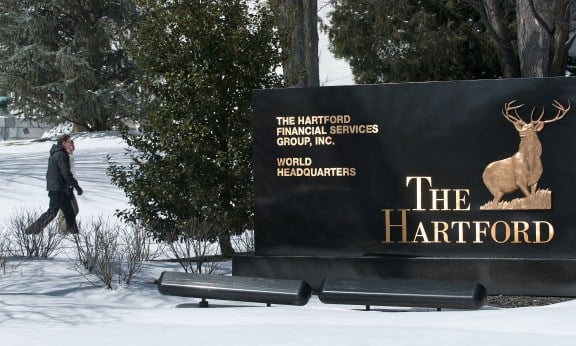In-force VA block lapse rate jumped by nearly 50% after Hartford announced it would leave annuity biz; many contracts in the money
More variable annuity customers have been surrendering their variable annuities at The Hartford Financial Services Group Inc. since the company announced in late March that it is exiting the business
During the first quarter, the annualized lapse rate — the rate at which customers surrender their variable annuities — for Hartford's U.S.-based VA block was about 14%, Christopher J. Swift, the insurer's chief finance officer, said during an earnings call last week. But in April, following the company's announcement, annualized lapse rates were running at 20%, David N. Levenson, the insurer's president of wealth management, said during the May 3 call. This figure “is to be expected, given the company's action to suspend new sales,” according to a report by FBR Capital Markets on Hartford's first quarter results.
“It's too soon to judge whether lapses will remain at these levels, but if they do, it will accelerate the runoff of the VA book,” Mr. Swift.
Financial advisers who sold variable annuities in the pre-crisis days know that their clients generally have access to richer living benefits at lower prices. These legacy variable annuities tend to have the added benefit of being “in the money” — where the value of the withdrawal or income benefit attached to the annuity is actually worth more than the value of the VA account.
In fact, 40% to 50% of the lapsed VA contracts from The Hartford were in the money, Mr. Levenson said.
Analysts note that when insurers drop a line of business, clients will drop their products, even if the benefits attached to them are better than what's available in the marketplace.
It's not certain why this is. In some cases, VA holders may allow policies to lapse because they erroneously believe that their annuities will no longer be honored after their carrier exits the business. Others may be concerned about what might happen to their fees since no more new VA money will flow into the carrier.
Whatever the thinking, brokers might use The Hartford's exit from the business as an opportunity to nudge clients into new annuities elsewhere, via a 1035 exchange.
“In any event, when a company gets out of the business, you see a pickup in surrenders — appropriately or not — and that looks like what's happening with Hartford,” said Andrew S. Kligerman, a managing director at UBS Securities LLC.
He added that given the size of Hartford's business, its exit from VAs is playing out differently than what other smaller players, such as Genworth Financial Inc., experienced when they left the business.
Given insurers' renewed focus on VA risk management, the new annuities probably won't have the same attractive guarantees and will likely be more expensive than the old products. Further, clients who exited previous policies while they're “in the money” lose their accrued living benefits and start a new surrender period in their new contract.
After backing out of the VA business, carriers strive for a careful balance in lapse rates. If more clients than expected hold on to their variable annuity and tap their living benefit, it could cost the insurer even more money. ING Groep NV, for instance, took a 1.1 billion euro charge in the fourth quarter of 2011 after adjusting its lapse assumptions for its closed VA block in the U.S.
At the same time, if too many clients surrender in a given period, carriers have to write down the liability attached to the VA block sooner than expected, which hurts profitability, analysts said.
Hartford spokesman David Potter did not immediately provide comment.







